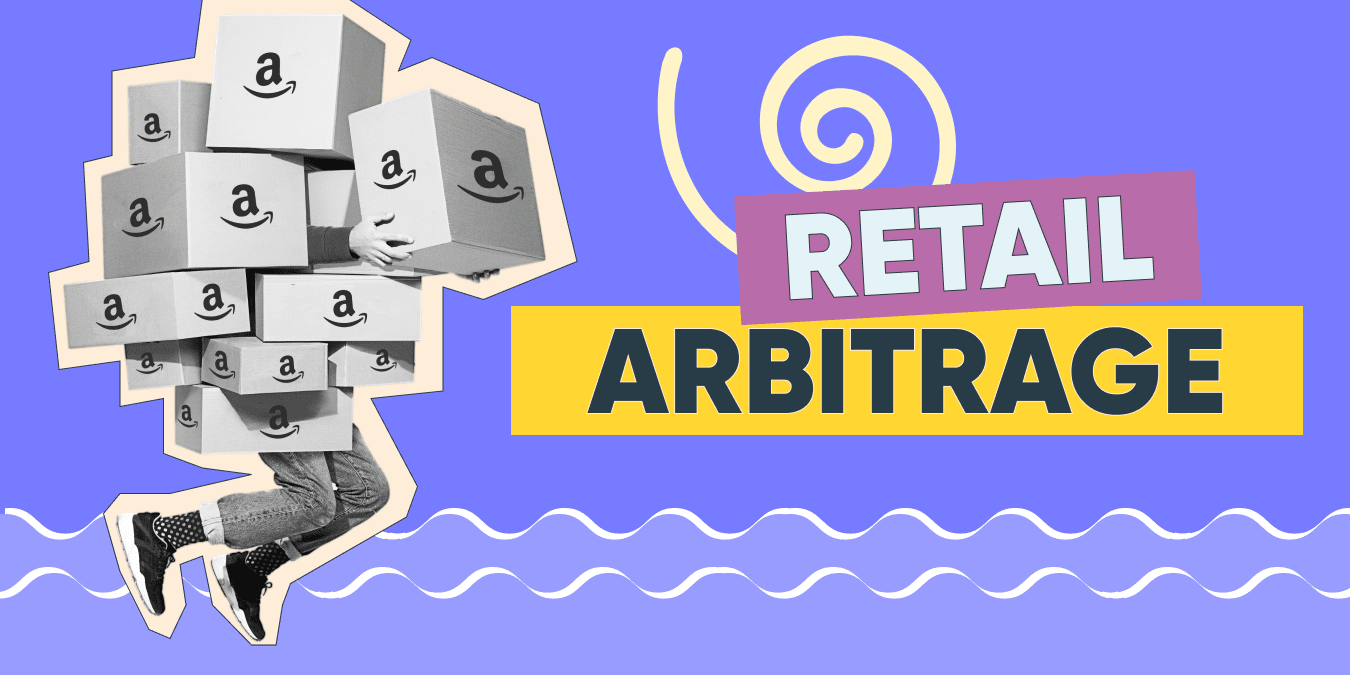
You have heard the term “Amazon Retail Arbitrage” before but have no clue as to what it is? Well, you have come to the right place!
You have been wanting to sell on Amazon marketplace but don’t have the budget to launch your own private label product?
Well, one way to enter into Amazon’s selling world is by starting your own retail arbitrage business. There is comparatively less resistance for a beginner to enter through this way and one might have an established Amazon presence for his/her business.
What is Amazon Retail Arbitrage?
What is retail arbitrage? Let’s put it in very simple words; retail arbitrage is all about buying low and selling high on a marketplace.
The prices vary in different markets and getting the products from a low cost market can help businessmen make profits by selling the products at a higher price on eBay or Amazon.
If we talk about Amazon retail arbitrage; you buy a product from a retail shop and sell the purchased product on Amazon at a higher price, this will be a win-win case for you. You’d need a low budget to do this without even buying the product for the time being.
This is a short description of how retail rabitrage works, but the world of retail arbitrage is a lot broader!
Let’s further find out…
Why Choose Retail Arbitrage Over Other Business Models On Amazon?
First thing’s first, as a beginner, why would you want to choose retail arbitrage over other business models on Amazon. Let’s quickly go through different business models to answer this question:
Private Label – In this business model, a seller gets an existing product and makes modifications to it. A seller can add his own label to the product and sell it on Amazon at a higher price. The increment in quality can help a person sell at a higher price but modifying a product is costly and requires a huge amount of capital.
Wholesale – In this model, a person buys products in bulk from a distributor or a manufacturer and sells them at a higher price on Amazon.
Dropshipping – From buying the product to shipping it to the customer, the whole process is carried out by the manufacturer.
Handmade – A seller makes or crafts the products at home and places them on Amazon for people to buy. This process requires a lot of time and energy.
The question “why is retail arbitrage better than these business models”? when you’re starting off as a beginner can be answered by discussing the pros of retail arbitrage. These four reasons are the main factors of why we think a beginner who is out to set his foot in the market should start with Amazon retail arbitrage.
Pros
Lower Capital – The cost to start retail arbitrage is very low. Other models like wholesale and private labels need a huge capital to initiate.
Flexible schedule – It is a type of business which you can do according to your own feasibility. If you have time, you can make it a full-time profitable business. If you have taken this up with your 9 to 5 job, you can keep it as a part-time activity.
Instant Gratification – When you walk into the store, the products are readily available, so you can pick them up and start prepping them to ship them to Amazon.
Easy Logistics – You deliver the products to Amazon if you select FBA (Amazon Completion), then Amazon takes care of storing your product and delivering it to your customers.
Cons
Just like everything, retail arbitrage has cons that should also be looked at.
We cannot sell everything we desire – Some products have certain restrictions from brands that they cannot be resold so sourcing products from retailers does not mean that you have a clear “green” signal to resell it or if the product is authentic or not.
Time-consuming – In retail arbitrage, searching and sourcing the products from the market can be a bit time-consuming as you require a lot of research to find the right product category that will not be later disputed by the brand.
A beginner’s Guide to Amazon Retail Arbitrage
Now you know what retail arbitrage is but how to do retail arbitrage in the right way? Let’s proceed to the steps needed in having an Amazon presence with online retail arbitrage model:
- Create an account on Amazon Seller Account
- Start looking for the right product category
- Look for the products in nearest and the best stores for retail arbitrage
- Use the Amazon Seller App
- Get your products listed on Amazon and start your business
1. Create your Amazon Seller Account
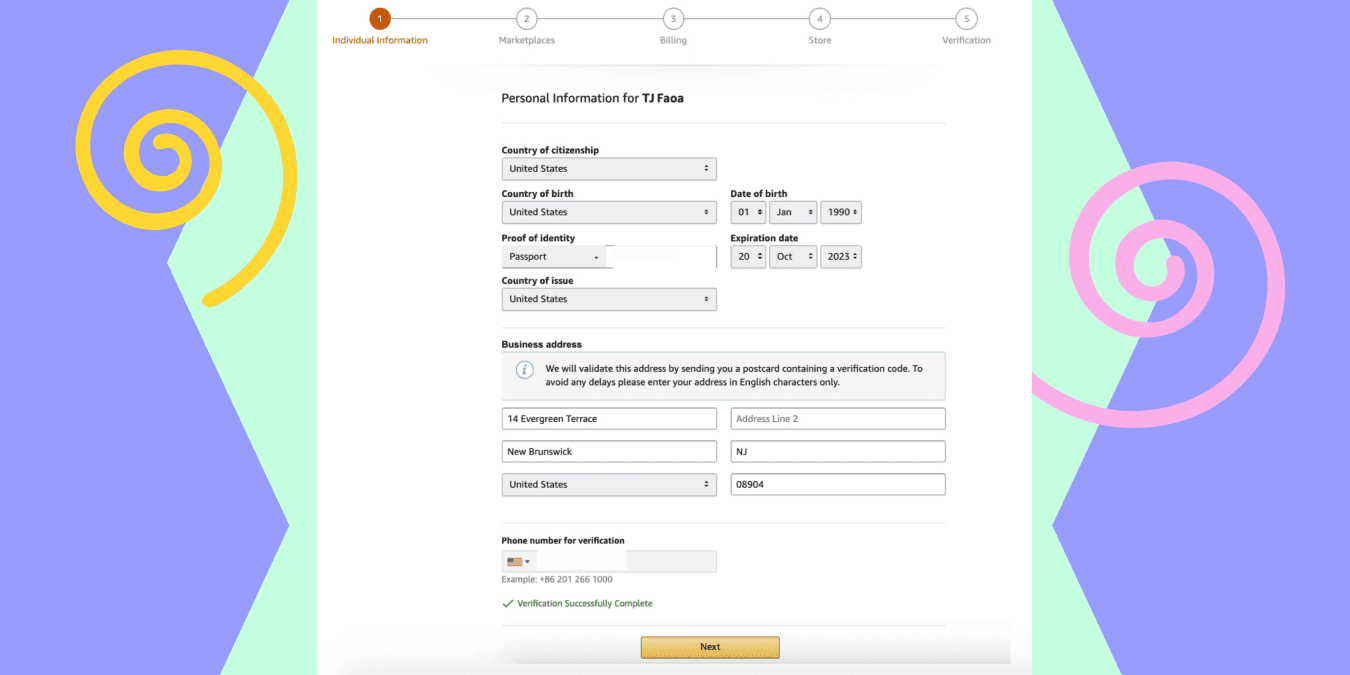
First of all, you need to make an Amazon Seller Account. It’s super simple; you need to give in your personal information such as an address, your name, some contact information, and a security number. Lastly, you have to provide some tax information to know that you’re going to pay your taxes with any profit that you’re going to make on Amazon. There are two options to decide when you make an account on Amazon:
There is a professional account that will cost you around $40 per month regardless of how many products you will be selling.
Then there is also an individual account that doesn’t cost a penny for creation, but a seller has to pay $1 for each sale on Amazon.
We would recommend that you use a professional account. In this way, there won’t be any concern about the cost per price to pay and you may be able to sell products in bulk on Amazon. You can also broaden your product categories under a fixed fee.
However, if you’re still unsure whether you actually will continue your business, go for an individual account as the money you’ll be paying will be sale-dependent. You can always change that into a professional account.
2. Start Looking for the Right Product Category

You have to be careful about the product category you want to choose. You wish to search for categories of products that don’t require clearance and are not heavier and bigger in size.
You have to closely keep an eye on how well Amazon sells a specific product and track its pricing. All the charges from amazon fees to shipping should be kept into consideration when choosing the right product category.
You have to factor in the size and weight of your product. Heavier and larger merchandise significantly increases the shipping costs, regardless of the fact if you’re using Amazon’s fulfillment service or not.
Best Retail Arbitrage Items
Here are some of the product categories that you can work with and find some of the best retail arbitrage items under these categories.
- Sports Equipment
- Books,
- Clothes,
- Household, and Kitchen Accessories
3. Look for Products in the Nearest and Best Stores for Retail Arbitrage

The only way for you to actually know which products are winning is to go to the store! Anyone can tell you that “Hey, this product will be a great option” but to compare different prices, you’d need to check out different stores.
Your target should be to buy products at the lowest possible price.. Buying in bulk can help you save a lot since the price per item gets lowered when bought in bulk.
Best Stores for Retail Arbitrage Sourcing
Walmart, Target, TJ Maxx, Home Depot, Lowes and Kmart are some of the best stores for retail arbitrage sourcing. Of course, there are many other big-box retailers depending on where you live.
Knowing where to find your products will be the deciding factor for your success in your online retail arbitrage business. The last thing you want is that you go to a retail shop and scan all kinds of products under all product categories. Here is what you can do about it:
- Learn the format of the clearance sections
- Communicate with store managers and increase your connections.
- Look in the top and bottom shelves as they may contain neglected items which have a higher chance to be on clearance.
- Learn about the markdown schedules of the stores
4. Use the Amazon Seller App to
You should always scan a product on Amazon Seller App before purchasing it from a retailer. The app will tell you the precise costs associated with selling the product and help you make informed decisions.
By knowing the clearance details, profit potential, ratings, and reviews, you can check if your decided product may sell well on Amazon.
But how to use Amazon Seller App for retail arbitrage? Let’s find out..
Scan Clearance
- Open up the application and click on the camera located at the top right corner.
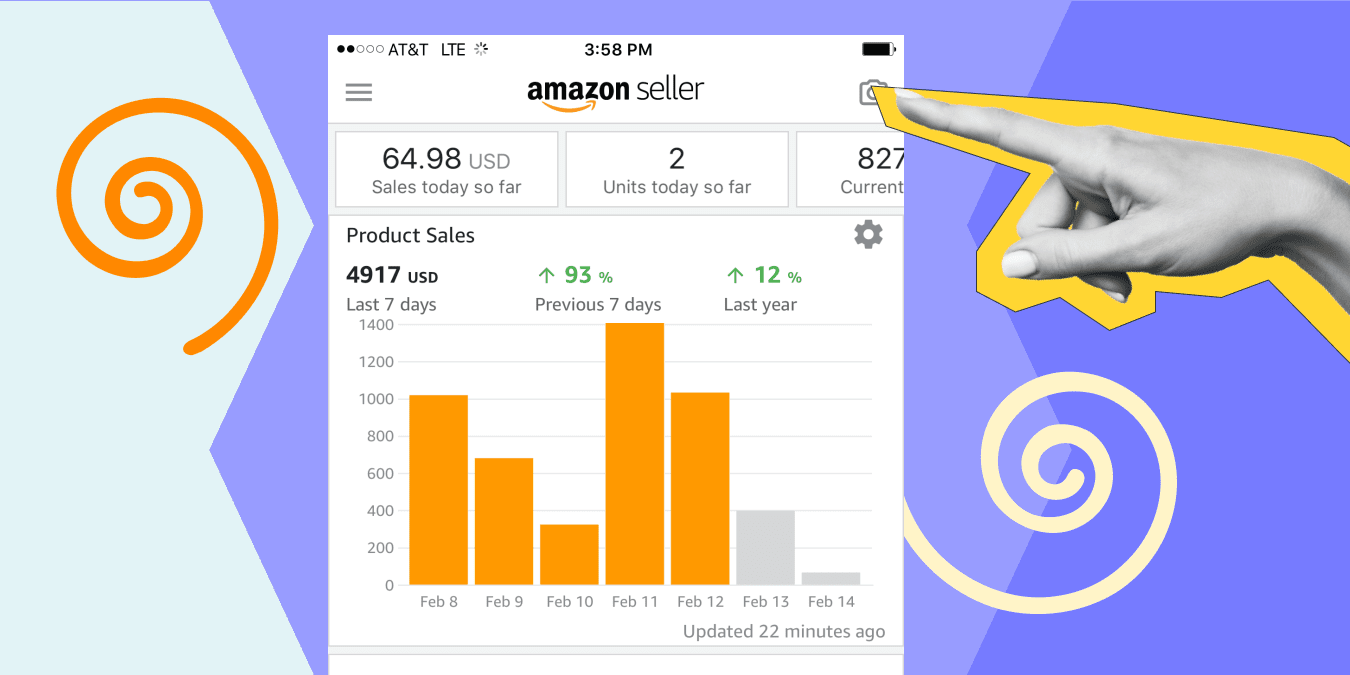
- When the camera is switched on, look through the camera at the bar code of the product you want to analyze.

- A screen like the one shown below will appear once you scan a product:
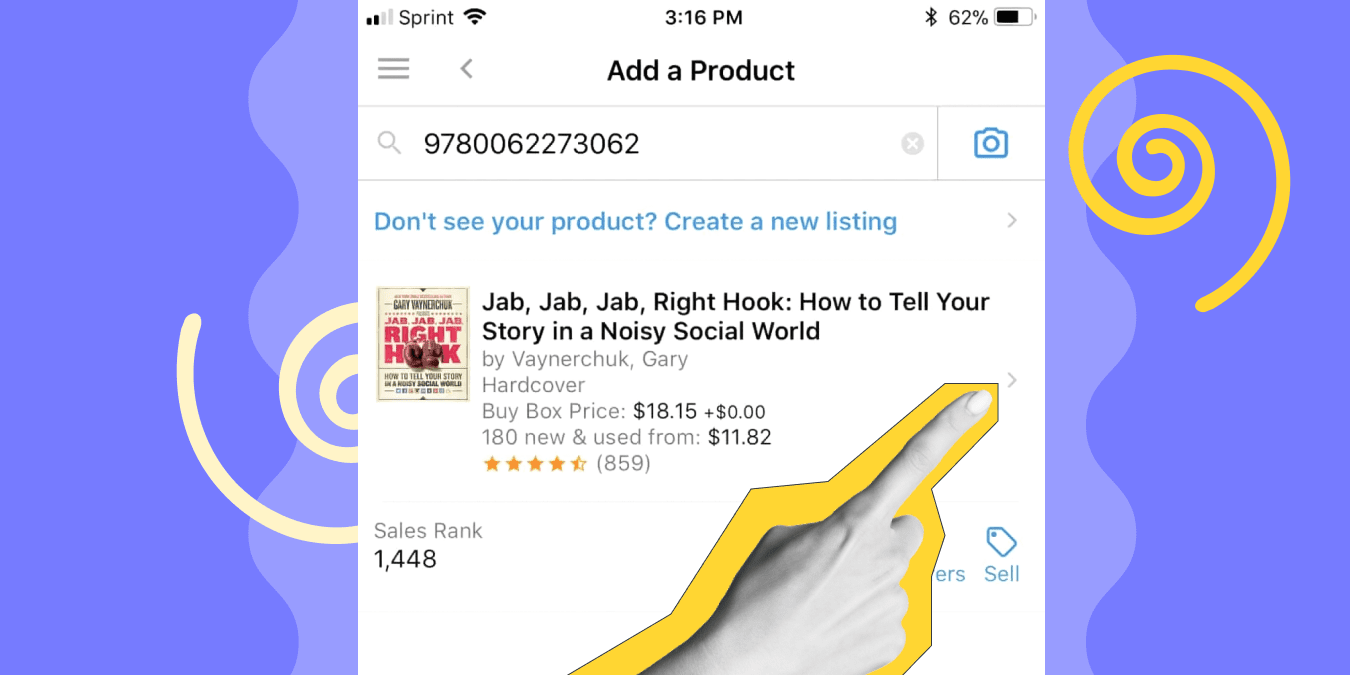
- By clicking on the arrow on the right side of the screen as shown above, you will be taken to a page like the one shown below.

Check Selling Eligibility and Sales Rank
- You need to look for two things on the screen. The first is whether the product is eligible to be sold or not; you can see this under “Selling Eligibility”. The next step is to look below the name of the product to check its sales rank. The lower the sales rank, the higher the ability for you to actually sell the product because it will be a winning product for you. However, If you find that the sales rank is high, it’s better to switch to another item to sell.
Check Profit Potential and ROI
- Now by clicking on the arrow on the right side of the screen, you will be able to calculate the profit for an item as shown in the picture below:
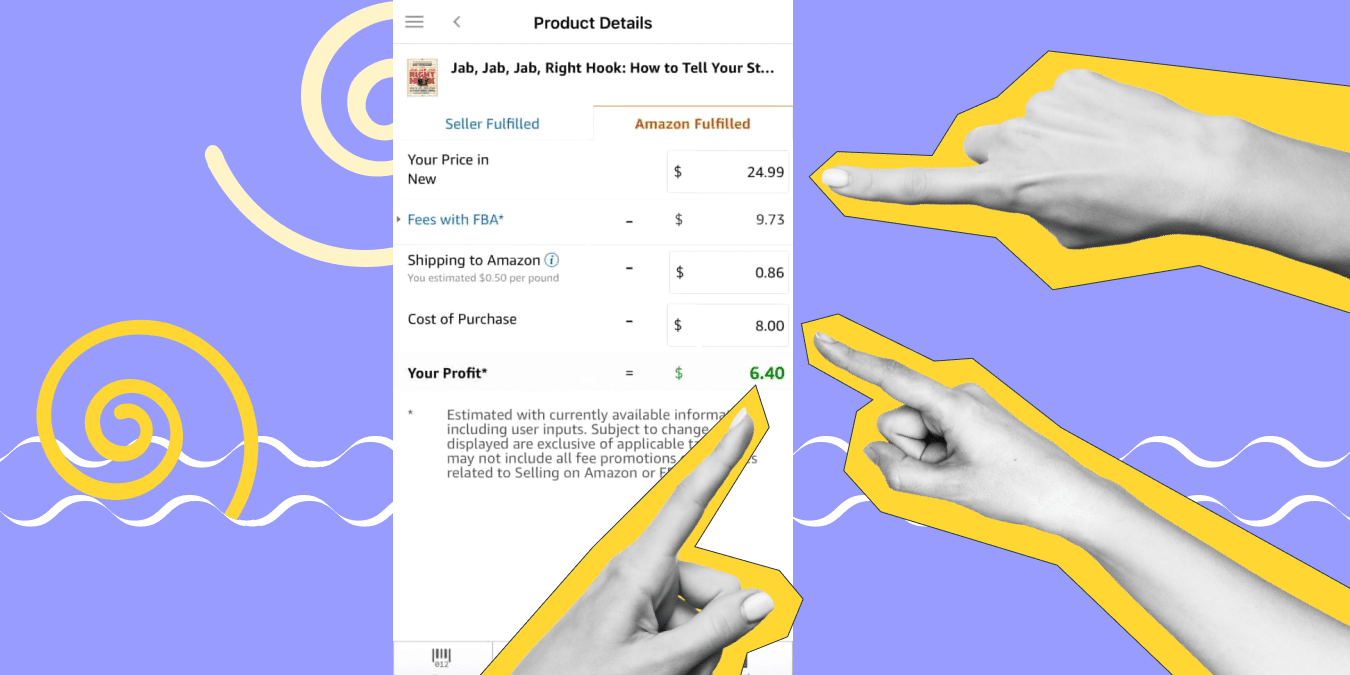
- Put in your expenses and the price you want to sell your product for. Once you enter that information, you will get the profit potential for the item that you want to sell. The red text will indicate that it’s going to be a loss whereas a green text will indicate that you can actually go with the product as it’s going to make you profit. Having a profit potential of more than $3 can yield higher profits.
- The next step to take is to find the return on investment. You can calculate that by dividing your profit by the cost of the item. A 50% or higher return on investment is a strong hint that you will be earning profit.
Retail Arbitrage Tools
- A tool you can use when you’re scanning a product is Keepa. Keepa will give you a chart of the number of times a product has been sold in the past, where do the sales rank actually lie, and how well Amazon is selling that product. Besides Keepa, some great tools like Amazon Letter App or Inventory Lab (Scoutify 2) can help you a great deal. These apps basically will give you all kinds of expenses; how much can you sell it for, how much the FBA fees are, how much the shipping costs and sales tax are.
Thus, a few things to remember when you’re starting off with Amazon retail arbitrage and looking out for the best product:- Choose the retail arbitrage tools that are convenient for you to use
- Compare prices of products in different stores
- Look out for any restrictions
- Find out if there is any competition
- Check reviews and ratings
- Calculate expenses
- Make sure the sales rank is well below 200,000
- Look out for the ROI and the potential profit
5. Get your products listed on Amazon and start your business
After you have decided what to sell, the next move is to list the products on Amazon and start your business. Optimizing your listings is a time-consuming process so we recommend that you go through this Amazon Listing Optimization Guide to make the process as hassle-free as possible.
Sellbery is one option that you can look into that will considerably help you to optimize your Amazon listings with just a few clicks here and there!
When you do list your product, you will be given an option on how much you’re going to actually sell it for. Now, of course, the lower the price, the better because it will help you win the buy-box and the buy-box is what the customer sees when they are actually navigating through your product page. So your goal should be to choose a price that is also lower than the competitors but will also help you make your profit as well.
FBM or FBA Retail Arbitrage?
The next question is whether you should use FBM and FBA for your retail arbitrage business? Well, that depends on how many products you are selling. If you’re selling only 2-3 products and you’re just testing the waters then FBM is a better option but if you’re selling a huge variety of products and you don’t have the time to send it to each customer directly and bear the shipping charges then FBA might be a wiser option for you.
Does Retail Arbitrage Work?

You now know about how Amazon retail arbitrage actually works. A question that may now appear in your mind is if retail arbitrage actually works in today’s era.
The short answer is yes, it works.
A detailed answer would bring up certain questions such as:
- Isn’t there high market saturation?
- Is retail arbitrage worth it?
- How can you beat your competition?
- Can you make money with retail arbitrage?
Isn’t there high market saturation?
While there are a lot of people who know what retail arbitrage is, very few people actually get to see profit or let alone find their first product. The process isn’t hard, but it isn’t simple either. The hard work involved to find the first product takes a lot of time, energy, and research; so we are talking about 80%+ of the people who don’t actually even make it to finding their first product.
Fortunately, there is a silver lining for everyone who wants to go through the struggle and frustration as a beginner: The opportunities in the big world of retail arbitrage for beginners are broad.
Is retail arbitrage worth it?
Let’s move on to the second question, “Is retail arbitrage worth it?” Well, many people put forward the concern that retail arbitrage is not worth the time one puts in. Yes, if you are not planning things out carefully and scanning every product that you see on the aisle under every product category then you will definitely be drained out before you know it. While it is a learning process and there will be mistakes at your end, you should still set down a detailed plan on how you want to go about it.
How can you beat your competition?
Now to answer the question, “How do I get ahead of my competitors?”. Well, we need to look at certain factors. The factors include the location, markdown schedules of the stores around you, the product you choose and many more. So there is not a specific answer to this question.
A person must know his competitors well and act smart to stay ahead of them.
Can you make money with retail arbitrage?
Financial success in your online retail arbitrage business totally depends on how much time one is willing to put in. A person has to go through the frustration of performing each step precisely, if they are determined to earn success. The more time, intellect, and money one is able to invest, the more he will earn from retail arbitrage.
Many people take up online retail arbitrage as a full time business if they do it the right way. It’s totally up to you what your take on retail arbitrage is; whether you want to do it as a side hustle or you eventually want to quit your nine to five job to make it a full time business, anything that suits you will work fine.
Is Retail Arbitrage Legal?

No, retail arbitrage is allowed and is not illegal. However, just because it’s legal, doesn’t mean there are no challenges involved. There are certain pointers that you need to keep in mind when you’re starting your online retail arbitrage business:
- You should have the receipts of your sourced items so that you may be able to present them to prove credibility at the time of need. However, the receipts won’t always be enough to solve a product authenticity issue.
- Avoid dropshipping by certain companies and manufacturers on Amazon.
- Do not sell branded items
- Avoid items from brands that only allow their products to be sold through authorized distributors
Nonethless, you should be prepared to face some disputes from either a given brand or an authorized distributor for not having written permission explicitly granted. While it might be legal to resell merchandise, sometimes marketplaces’ rules and regulations turn out to be stricter than the law.
How Do Taxes Work for Retail Arbitrage?
Taxes are a tricky subject. If you are considering starting Retail Arbitrage, you should definitely get a resale certificate. Before we dive into what a “resale certificate” is, and how to get a resale certificate to get yourself out of paying sales taxes, let’s actually first talk about sales taxes:
Sales Taxes
Sales tax is a certain amount that a seller has to collect from the buyer and is included in the price of the item. After getting it from the customer, the seller pays the tax to their state. If their business has a sales tax nexus with the state, then the sellers are supposed to collect taxes from the customer.
What is a Resale Certificate?
A resale certificate enables you to avoid paying taxes for the goods you have bought from the distributor, you instead collect that tax from customers. A resale certificate, also known as reseller permits, are held by businesses that are reselling items or using items that they have bought as raw materials to produce their own product.
While it allows you to avoid taxes on items that are sold to the customers, this certificate does not exempt you from paying for the supplies used in your business. Again, this tax is collected in the form of sales tax that will be collected from the customer.
However, you do not have to pay tax for the items used regularly in your business.
Who and how can one apply for a Resale Certificate?
If you have a business that buys wholesale or uses purchased items in your business, then you have a higher chance to get the certificate.
To be more specific, businesses with tax exempt status, resellers and retailers can apply for a resale certificate with their state.
In order to apply for a resale certificate, you need to follow three basic steps. These three steps might vary depending on the state you’re in but are, nonetheless, the same:
- Apply for a sales tax permit from your state’s Department of Revenue before applying for a resale certificate.
- Fill out the “resale certificate” form, in which you should clearly state the details about your business and which products will need to be exempted from the sales tax.
- Once you’re done with all the formalities, you’ll receive your sales tax certificate of exemption or you’ll receive a resale number.
Expert Retail Arbitrage Tips
Finally, we have put together some expert-level retail arbitrage that we have gathered from different eCommerce sellers:
- Use the Amazon App or any other tool that you will use the “right way” to know how to stay profitable.
- Do not assume when you’re scanning your products. Even the most “ordinary” products can make you a huge profit.
- Figure out how each store runs its business and learn the markdown schedules of individual stores which can help you to be ahead of your competition if you use this information to your advantage.
- Be patient in learning the art of retail arbitrage. Do not give up just after a few visits to a few retail shops. Finding the right product category and good deals take time.
To sum it up…
Retail Arbitrage can bring you an extra side income if you’re looking for a side hustle, have a bit of a budget, and time to search for great deals to get started. Don’t rush into things and try to perform retail arbitrage at your disposal the right way.
Following the practices mentioned in this blog the right way can make or break your Amazon retail arbitrage business, so make sure you work out your plan carefully to get yourself in the Amazon ecosystem.
If you want to learn more about great tips and tricks sourced from different marketplaces, quickly go through Sellbery’s list of blogs and enlighten yourself with great practices.
Was this news helpful?







 Yes, great stuff!
Yes, great stuff! I’m not sure
I’m not sure No, doesn’t relate
No, doesn’t relate



